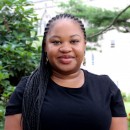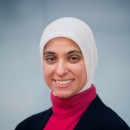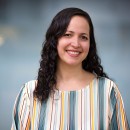Faculty News
Pages
 The School of Social Work Welcomes Greer Hamilton
The School of Social Work Welcomes Greer HamiltonGreer Hamilton is a place-based researcher who examines how systems of oppression are embedded into the built environment and how they thus impact individuals’ health, well-being and use of public spaces. As a researcher, she uses community-engaged and arts-based approaches to understand study participants’ experiences with places. Prior to her work as a researcher, she worked in Buffalo, New York for nonprofits focused on health inequities and community capacity building.
Of her decision to come to the University of Michigan School of Social Work, Hamilton said, “It was important to me to be in a school committed to community-engaged and arts-based research and teaching. Commitment to these is evident in the work of the university at large and also in the work of the faculty, staff, and students of the School of Social Work. I am excited to be a part of a community so dedicated to using creative approaches to address social issues.”
Hamilton holds a BA in Health and Human Services and a Master of Social Work degree from the University of Buffalo (New York), and a PhD in Social Work from the Boston University School of Social Work.
- September 12, 2023
 The School of Social Work Welcomes M. Candace Christensen
The School of Social Work Welcomes M. Candace ChristensenM. Candace Christensen’s research takes a critical feminist approach to community-engaged, qualitative, arts-based research methodologies that prevent and respond to gendered, racial and anti-LGBTQ+ violence. Their commitment to this approach is grounded in their positionalities as a Femme genderqueer, poly-sexual, artist-activist and survivor of sexual violence. They aim to deconstruct paradigms and practices that perpetuate power-based violence and to build cultures focused on self-determination, a sense of connection and mutual empowerment. They use Theatre of the Oppressed to construct sexual violence prevention interventions, and they have experience with community-based theatre, sexual violence-prevention activism, queer liberation and racial justice, and with helping students implement creative approaches to social work practice. Their recent work focuses on queer and trans youth development.
“I came to the U-M School of Social Work because the school values arts-based social justice research,” Christensen said. “Using the arts in research, teaching, and practice creates a brave space for folx to take risks that enrich and expand our understanding of social justice topics like interpersonal violence, anti-Black racism, and queer and trans phobias. Bringing an arts-infused lens to these issues shows why these problems exist and what we can do about them.”
Christensen holds a BA in theatre and literature from the University of Texas at Dallas, and an MSW and a PhD in Social Work from the University of Utah.
- September 12, 2023
 Luke Shaefer’s New Book Exploring “The Injustice of Place” is Published
Luke Shaefer’s New Book Exploring “The Injustice of Place” is PublishedProfessor Luke Shaefer’s latest book, “The Injustice of Place: Uncovering the Legacy of Poverty in America,” is now available. Together with his co-authors, Shaefer looked at poverty, combined with health outcomes and social mobility rates to examine America’s most disadvantaged communities — almost all of which are rural, and are concentrated in three regions: Appalachia, South Texas, and the southern Cotton Belt.
“Throughout these regions, we saw the same themes emerge again and again—unequal schooling, the collapse of social infrastructure, violence, entrenched public corruption, and structural racism embedded in government programs,” writes Shaefer.
- August 17, 2023
- Learn more »
 Fatima Salman Selected to Growing Michigan Together Council Workgroup
Fatima Salman Selected to Growing Michigan Together Council WorkgroupENGAGE Program Manager and Lecturer Fatima Salman has been named to the Higher Education workgroup of the Growing Michigan Together Council. “The diverse workgroup members of the Growing Michigan Together Council will be instrumental in our effort to grow our economy and population while protecting our natural resources,” said Governor Gretchen Whitmer. “These members represent a range of professions, communities, and perspectives—all of which are essential to developing a comprehensive strategy for growth. I look forward to hearing from the council and its workgroups later this year.”
- August 16, 2023
- Learn more »
 Susan Radzilowski Talks with Michigan Radio on Gender-Affirming Therapy
Susan Radzilowski Talks with Michigan Radio on Gender-Affirming TherapyLecturer Susan Radzilowski, MSW ’82, spoke with Michigan Radio about the importance of psychological support for trangender kids, young adults and their families.
“Not only is cost a barrier to care, but it's sometimes just accessing therapists who understand the principles of gender-affirming care, which is to elevate the child's voice, to hear the child's voice, to offer exploration in a supportive environment, to listen and to understand what's helpful versus what's harmful,” she said.
Radzilowski is one of the mental health providers working with a new program by Stand with Trans that provides financial support for trans youth who would otherwise not be able to afford mental health counseling
- August 16, 2023
- Learn more »
 Camille Quinn Awarded NIMHD Research Grant
Camille Quinn Awarded NIMHD Research GrantAssociate Professor Camille Quinn has been awarded a National Institute of Minority Health and Health Disparities R21 research grant. Her study will adapt mindfulness-based stress reduction interventions for justice-involved Black teenage girls.
"This National Institute of Health (NIH) grant is a first step in my line of research on Black girls (and their parent/caregiver) who are an understudied and underserved population. I'm thrilled to have the opportunity to lead this project in partnership with the Franklin County Juvenile Court and my colleagues at Ohio State,” said Quinn. “What we learn from this study will help us develop culturally tailored interventions to promote Black girls' healing, mental health and crime desistance in a R01, the largest NIH grant in a randomized control trial here in Detroit, MI."
- August 9, 2023
 Karla Goldman discusses JCLP with the Detroit Jewish News
Karla Goldman discusses JCLP with the Detroit Jewish NewsProfessor Karla Goldman spoke with the Detroit Jewish News about the School’s Jewish Communal Leadership Program, which she directs. The five-semester program gives students an education in social work and Jewish history and culture, along with skills for working with organizations and communities, said Goldman.
- August 8, 2023
- Learn more »
 William Elliott III Speaks with Forbes on the Impact of a College Savings Account
William Elliott III Speaks with Forbes on the Impact of a College Savings AccountProfessor William Elliott III spoke with Forbes about how San Francisco’s Kindergarten 2 College program, which begins with just a $50 deposit in a college savings account can make a difference. “When you have an asset, it allows you to begin thinking about your future in a more tangible way.”
- August 1, 2023
- Learn more »
 Fernanda Cross Discusses Latinx Teen Empowerment with WEMU
Fernanda Cross Discusses Latinx Teen Empowerment with WEMUAssistant Professor Fernanda Cross spoke with WEMU about the Latinx Teen Empowerment Group at Ypsilanti Community High School. Cross’ research focusing on Latinx immigrants in southeast Michigan lead to the program, which provides small group therapy in Spanish to support mental health and create community. The digital news magazine Concentrate has a companion story to the radio conversation.
“I'm a Latinx immigrant like them. And I know how much support our community needs, and I know all of our strengths. I know what we're capable of,” said Cross. “If we are able to support the kids, they would be able to accomplish so much more and really be able to demonstrate their strength and just have a better experience — better outcome — for their lives.”
- July 27, 2023

 Shawna Lee and Andrew Grogan-Kaylor Receive Grant from Eunice Kennedy Shriver National Institute of Child Health and Human Development
Shawna Lee and Andrew Grogan-Kaylor Receive Grant from Eunice Kennedy Shriver National Institute of Child Health and Human DevelopmentProfessors Shawna Lee and Andy Grogan-Kaylor have been awarded a grant from the Eunice Kennedy Shriver National Institute of Child Health and Human Development for the Global Families project. Their project will use data from over 520,000 families in 57 low- and middle-income countries to examine the similarities and differences in parenting and child development, and the effects of social factors, including parental physical abuse and violent norms and crimes, worldwide.
"We are thrilled that the grant provides us with the opportunity to look at the relationship of gender inequality, parenting and child development in a large number of countries worldwide, and that the grant also gives us an opportunity to carry out this project working with undergraduate students at UM-Flint," said Grogan-Kaylor.
- July 27, 2023